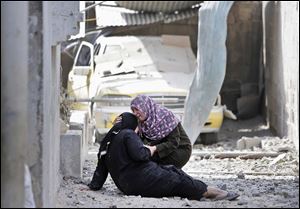
MIDEAST TURMOIL
Israel backs cease-fire extension
Hamas refuses truce,renews rocket barrage
7/27/2014
Palestinian Manal Keferna, 30, right, cries with her sister-in-law Najwa Keferna.
JERUSALEM — Under intense diplomatic pressure, Israeli leaders decided late Saturday to extend a halt of hostilities in the Gaza Strip for 24 hours but said their troops would maintain defensive positions and continue to ferret out tunnels from Gaza into Israeli territory.
Hamas, the militant Palestinian faction that dominates Gaza, rejected the extension of the temporary cease-fire requested by the United Nations, after renewing rocket fire on Israel Saturday evening.
“Any humanitarian cease-fire that doesn’t secure the withdrawal of occupation soldiers from inside Gaza’s borders, allow citizens back into homes, and secure the evacuation of the injured is unacceptable,” said Sami Abu Zuhri, a Hamas spokesman.
Twice already in the 19-day battle, Israel has embraced cease-fire initiatives only to resume its assault within hours when Hamas did not follow suit.
The end of a previous Gaza battle, in 2009, began with both sides declaring unilateral cease-fires.
With the Palestinian death toll topping 1,100 after 147 bodies were recovered from the rubble during Saturday’s lull — and with 42 Israeli soldiers killed in combat — calls for calm have only grown more urgent.
Secretary of State John Kerry, whose plea for a seven-day cease-fire was rebuffed by both sides on Friday night, convened Arab and European foreign ministers for another round of talks in Paris to press for an extension of Saturday’s initial 12-hour pause.
His calculation seemed to be that a succession of short truces might yet be cobbled together to begin unwinding the conflict.
For Israel, accepting the cease-fire extension offers an opportunity to thwart the threat of tunnels that could be used to attack or kidnap its citizens without risking more civilian casualties that have intensified world opinion against it.
A cease-fire extension also offers a way for Israel to regain the diplomatic high ground and, if Hamas keeps firing, buttress its argument that its operation is defensive.
Hamas also faced pressure to accept the truce.
A quiet Sunday would allow battered Gaza residents to prepare for Eid al-Fitr, the holiday that ends the holy month of Ramadan, early this week. It also would give their leaders time to regroup militarily and to press their demands in negotiations for a broader cease-fire agreement.
“The people here in Gaza have had enough, and honestly they are pushing Hamas for a cease-fire,” said Mukhaimer Abu Saada, a political scientist at Gaza’s Al Azhar University. “People are mad at Israel but they are also mad at Hamas — enough is enough. The situation that is existing now is just a lot of destruction, a lot of sadness, and people want to breathe. As long as Israel is not killing Palestinians, it’s like, OK.”
There was still the possibility that Hamas’ rejection of the cease-fire would not be accompanied by a spray of rockets, a calm that Israel would presumably reciprocate, allowing a lull to continue despite a face-saving rejection.
Significant gaps remain on the parameters of a durable truce.
Hamas wants the release of high-profile prisoners along with open border crossings into Gaza and a lifting of Israel’s restrictions on fishing, farming, and trade.
Israel wants international guarantees that Gaza will be demilitarized, including a monitoring system to ensure that imported supplies would not be used to rebuild tunnels.
The longer the temporary truces last, the more tunnels Israel can destroy, and the easier it would be for Israeli Prime Minister Benjamin Netanyahu to sell a cease-fire to his cabinet and constituents.
The military said its troops found four tunnels during Saturday’s 12-hour pause. Since the ground operation began July 17, a spokesman said, 31 tunnels have been unearthed and 15 destroyed.
Mr. Kerry, in Paris, reiterated his position that any temporary arrangement needed to be followed by an enduring solution that addressed both Israel’s security demands and Gaza’s economic crisis.
Mr. Kerry departed for Washington on Saturday night as Israel’s security cabinet was accepting the 24-hour extension in the pause.
Even as the cabinet met, more than a dozen rockets had soared into southern and central Israel, four of them intercepted by the Iron Dome defense system.
Hamas claimed responsibility for firing two at Tel Aviv.